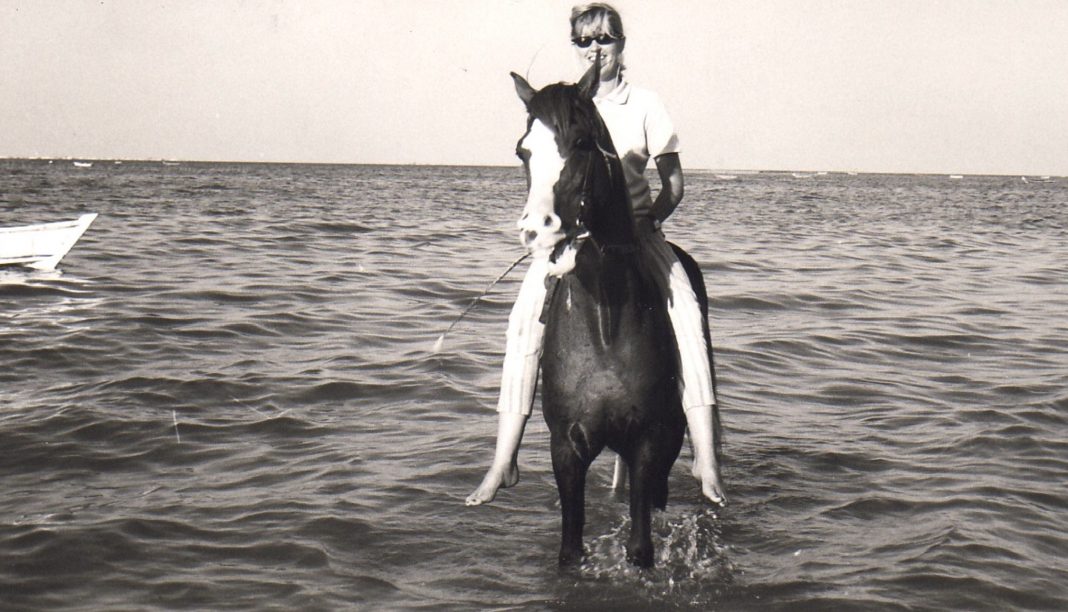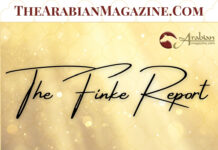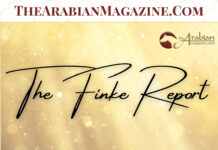Despite endless letters shoved up the chimney to Father Christmas, giving the colour, size and type of pony he should leave tied to the end of my bed, I didn’t own a horse until I was nineteen. I was living in Bahrain by then; back in the UK, my friends were enjoying the swinging sixties, but I had got married!
My wifely chores involved shopping in Manama at the local market. I got to know, by name, many of the elderly Arabs who sat patiently by wooden stalls piled high with fresh fruit and exotic vegetables. They would always help me in my choice, encouraging me to speak their language by holding up various fruits and vegetables while shouting out the Arabic name, their life worn faces splitting into laughter at my brave attempts to mimic them. It was on one of these shopping expeditions that I came home with more than my usual bunch of onions, spuds and a water melon.
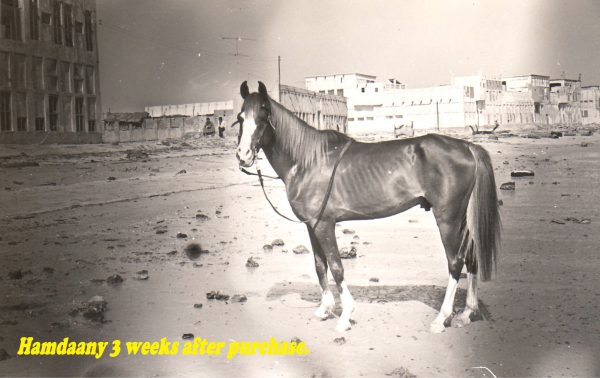
Hamdaany three weeks after purchase
Tied up against a wall down one of the alley ways leading to the vegetable market, was a horse. Its description fitted the one in my letters to Father Christmas, but closer inspection showed that it was pitifully thin, and its bones were clearly visible through its fine satin coat. I walked down the alley way to the chestnut horse and gently rubbed his nose; his eyes were dark and filled with sadness. While Ahmed weighed out my tomatoes – on brass scales held aloft by one thin arm, weights and measure would have had a field day – I asked him about the horse. Ahmed shouted across the alley way and a young boy appeared.
“You like to ride horse?” he offered.
I actually wanted to feed the horse, but I couldn’t upset the boy by telling him as much. I shook my head: “La shukran (no thank you), I just want to know about him.”
“Horse. Arabic horse,” the boy continued, struggling to communicate with me.
Using a variety of gestures, to support my limited Arabic, I asked why the horse was so very thin, he shrugged his shoulders, either not understanding the question or not wanting to.
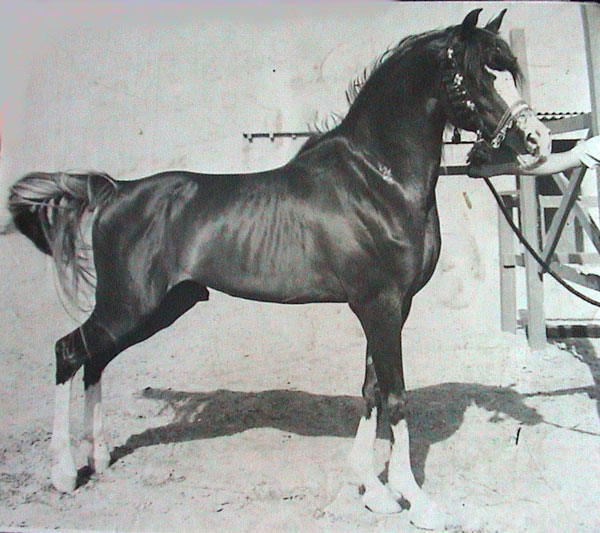
Hamdaany Kuwaiti
“You like buy horse fifty dinars,” he smiled at me.
No expert at the art of Souk bartering I fell at the first hurdle! “I don’t have fifty dinars.” I held up my purse with the week’s housekeeping.
“Okay, how much you have?”
Thinking I was on safe ground at less than half the asking price I smiled sadly, shrugged my shoulders. “Only twenty.”
“Ok, give me twenty. Where you live? I bring horse to your house tomorrow.”
I wondered just how I was going to break the news to a husband who had no interest in animals whatsoever – I should have listened to my mother; it was never going to work – as I drove home to face the music. This time, I decided to stand my ground, the horse was in a desperate state and needed help. I won the argument, by promising that I would re-home the horse once it had recovered. In the fullness of time, it transpired that the horse stayed and I re-homed the husband, but that’s another story.
I moved the car out of the lean-to garage and put in a bucket for water, improvised a manger, then went back to the market to buy a supply of dates, bran, whole barley and ‘jet’, or fresh Lucerne, to feed my acquisition. In those days, the horses on the island were fed a mixture of dates and whole barley, which would be soaked overnight, then a handful of bran would be added to the mixture just prior to feeding. The horses became adept at removing the stones from the dates and after each feed, a neat pile of date stones would be found at the edge of the manger.
By the time my horse arrived everything was ready for him. He looked even thinner than I remembered and as I took the rope from the boy’s hand, he advised me thus… “His name Hamdaany Kuwaiti, don’t give food or horse Shaitan.” This translated meant that if I fed the horse, he would turn into the devil.
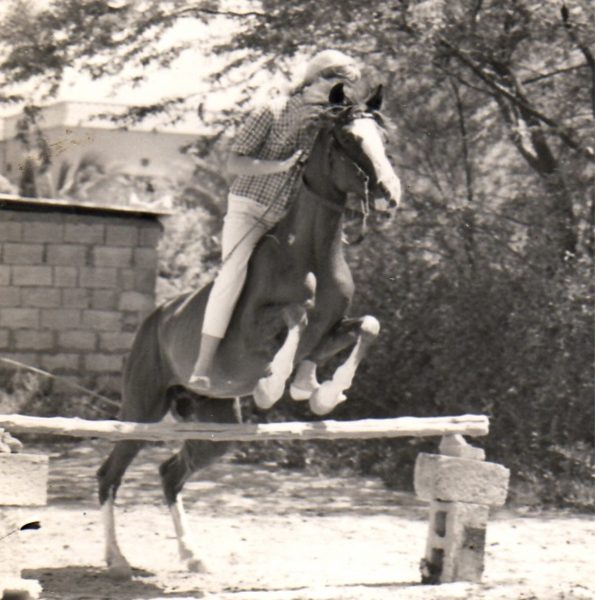
Improvised show jumps!
My only experience of horses was weekend rides back in the UK on a selection of old riding school geldings. Through the eyes of pity, I had purchased a 15hh Arabian stallion who had been kept half-starved so that he remained manageable!
Later I was to learn that Hamdaany is the family name of a desert line and my stallion had been bred by a tribe known as the Anzeh and had come to Bahrain via Kuwait. On each of his shoulders was a white mark, visible in the photographs, and I was told that these were tattoos, distinguishing marks of the breeder. A tattoo on each shoulder for a colt and on one shoulder for a filly. I was to meet Hamdaany’s sister eventually and she had one tattoo on her shoulder.
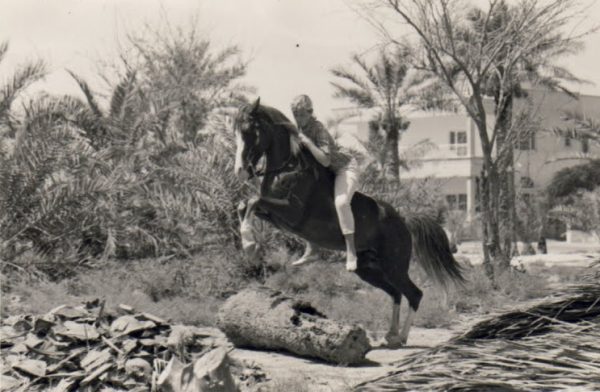
Jumping fallen palm trees
All very interesting and very impressive but in the meantime, what was I to do when I fed him up and he turned into the Shaitan?
I decided to give ‘Hammy’ the benefit of the doubt. Morning and evening, his feed bowl was filled and through the day while I was at work, he had as much jet as he wanted to munch on. After work, I took him for walks along the seashore on a rope headcollar and one evening when his backbone had ceased to protrude like a razor blade, I stood him next to an old wall and slipped onto his back. I squeezed gently and he walked forward. I waited for the buck and the devil to appear, but the devil had left him; Hammy was happy to carry me. I couldn’t afford to feed him and buy a saddle, so we dispensed with that idea and we went everywhere together bareback. Every evening after work, I rode Hammy along the seashore and to add variety to our days, I improvised show jumps – breeze blocks and palm tree poles – and taught him to jump.
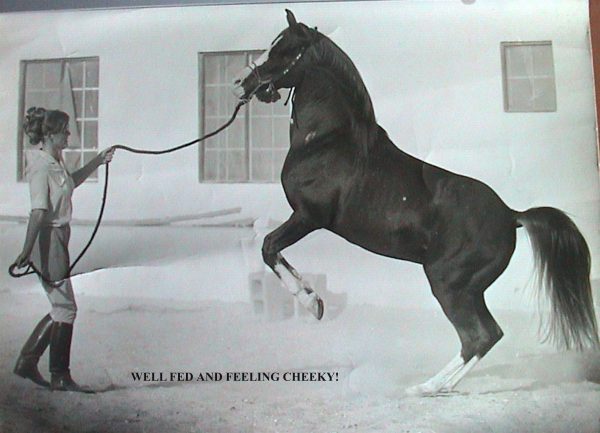
Jenny with Hamdaany – who was filling out
To while away some of the time when I was at work, Hammy befriended the children in the bungalow next door. The two little girls, Elena aged two and Karen aged five, would empty their mother’s vegetable rack of carrots, climb up on the garden wall and spend time stroking and talking to Hammy while he munched on the carrots. Whenever I was invited to friends for coffee, it was not unusual for me to turn up on Hammy having ridden across country and through date plantations to get there.
One of my friends had two young boys and Hammy would be left in their garden giving ‘pony rides’ while I enjoyed a coffee. If they got too boisterous, as boys do, Hammy would go down on one knee and roll them off into the soft sand. I trusted him and he never let me down, we were inseparable. However, I had to draw the line at him coming into my bungalow as he did on several occasions when I left both veranda doors open!
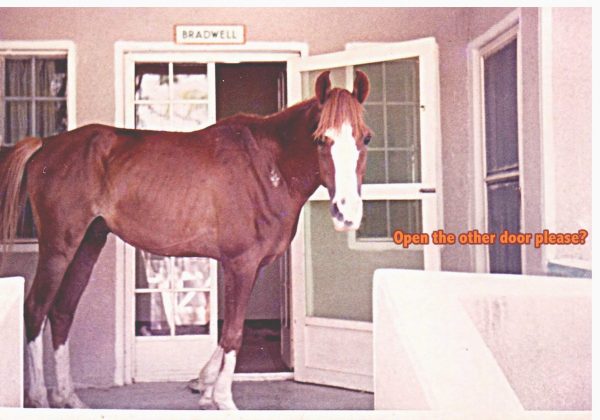
Hamdaany trying to go into the house!
I estimated that Hamdaany Kuwaiti was around 12 years old when I purchased him instead of the week’s vegetables! We had four wonderful years together before he died from a serious bout of what the locals called ‘sand colic’, nothing could be done. I was heartbroken at the loss of my friend and seeing my extreme distress my employer, His Highness Sheikh Isa Bin Sulman Alkhalifa, the Amir of Bahrain, generously gave me pure Bahraini stallion Seglawi Al Ahmar, from his private family stud.
My impulse buy in the market that day and a kindly gesture by His Highness Sheikh Isa resulted in the establishing of Pearl Island Arabians in the UK, and cemented my lifelong association with the Asil Arabian horses of The Royal Stud of Bahrain.
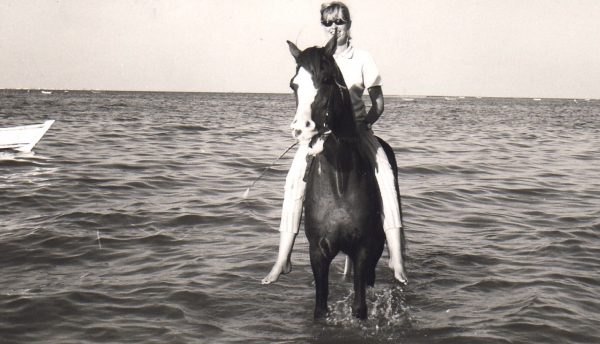
First published in The Arabian Breeders’ Magazine Volume IV Issue II, November 2019


